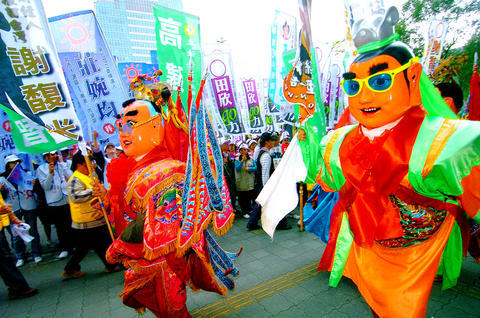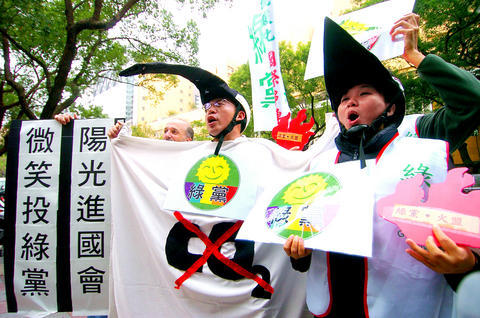The Cabinet yesterday said it would proceed with the one-step voting system for the legislative elections and two referendums on Jan. 12 and did not rule out replacing defiant local election personnel.
Cabinet Spokesman Shieh Jhy-wey (
He ruled out deploying the military, however.

PHOTO: CHIEN JUNG-FONG, TAIPEI TIMES
"There are many ways to achieve this goal. Relieving election personnel of their posts is one of them," he said. "Taking over election affairs is another. We are in the process of preparing for replacements and replacement personnel are ready [if needed]."
The decision of the Central Election Commission (CEC) to use the one-step voting system was clear, Shieh said.
"We are calling on local governments run by the pan-blue camp to refrain from challenging the law," he said. "We will not allow `one country, two systems' to prevail."

PHOTO: WANG MIN-WEI, TAIPEI TIMES
The CEC adopted the one-step voting system, but the Chinese Nationalist Party (KMT) prefers a two-step voting system in which voters would receive legislative ballots and cast them first before receiving the referendum ballots.
There are tough and soft measures to deal with the problem, Shieh said. The former include legal repercussions, while the latter could involve communicating with local election commissions on the matter.
Shieh emphasized, however, that there would be no room for compromise.
He denied that executive officials would "intimidate" local election personnel, but they would come to understand the consequences of defying the law and the best way of protecting themselves.
The government was confident that law-abiding voters would be well-protected, he said.
If any disturbances did occur, Shieh said, the KMT should be held fully responsible.
Shieh said that Vice Premier Chiou I-jen (
THE TAIPEI WAY
Elsewhere yesterday, Taipei Mayor Hau Lung-bin (
Yeh Chin-yuan (
"According to regulations on local election commissions, the commissioners are guaranteed a three-year term. Although the commissioners were named by the Executive Yuan, it has no right to displace them," Yeh said yesterday at Taipei City Hall.
Yeh said the post of election commissioner is often filled by the deputy mayor rather than the mayor to prevent electoral procedures from being influenced by politics, and that no laws or regulations grant the Executive Yuan the right to remove commissioners.
The CEC has said it will only print out the illustration of the one-step voting procedure for the election, but Samuel Wu (
The KMT caucus also slammed the CEC yesterday, raising fears of electoral fraud if the CEC officially announces the results of next month's legislative elections one week after the poll.
KMT caucus whip Kuo Su-chun (
"[CEC Secretary-General] Teng Tien-yu (
"If the CEC really enjoys the authority to decide who wins the elections one week after the elections, why would we still need to hold elections? The CEC could just designate [the legislators] they prefer," she said.
DPP Secretary-General Cho Jung-tai (
Finalizing election results within seven days of the election has always been mandated by the Election and Recall Law of Civil Servants (
At CEC headquarters, representatives from smaller political parties yesterday used the drawing of the order for parties listed on the legislator-at-large ticket to complain that the commission had treated them unfairly.
Legislator-at-large candidates from the New Party -- including current KMT Legislator Joanna Lei (雷倩), who changed parties after failing to secure KMT support for this poll -- the Home Party, the Taiwan Farmers Party, the Taiwan Solidarity Union (TSU), the Third Society Party and the Hakka Party said that the current version of a CEC poster explaining the new "single district, two vote" system only listed the DPP, the KMT, the People First Party, the TSU and the Non-Partisan Solidarity Union (NPSU).
Teng promised to print a new poster with the names and numbers of every party on the ballot.
In the new system, only one lawmaker will be elected from geographical districts.
But voters will cast a second ballot for a political party. The parties will then have extra legislators elected based on the proportion of the vote received.
In yesterday's draw, the Civil Party was listed first on the ballot, the Alliance for a New Constitution was second, the TSU third, the Third Society Party fourth, the DPP fifth, the New Party sixth, Green Party Taiwan seventh, the Taiwan Farmers Party eighth, the NPSU ninth, the KMT 10th, the Home Party 11th and the Hakka Party 12th.
Elsewhere, former DPP chairman Lin I-hsiung (林義雄) yesterday urged the public to vote in favor of the two referendums that seek UN membership for Taiwan during the presidential election in March.
Although local parties have different proposals, Taiwanese must tell the world that they are unanimous in wanting to join the UN, Lin said.
Lin said he was baffled by opposition to the UN referendum in Washington and Beijing.
The process would only help Beijing better understand the demands of Taiwanese people, he said.
Additional reporting by Mo Yan-chih and Flora Wang

TRAGEDY STRIKES TAIPEI: The suspect died after falling off a building after he threw smoke grenades into Taipei Main Station and went on a killing spree in Zhongshan A 27-year-old suspect allegedly threw smoke grenades in Taipei Main Station and then proceeded to Zhongshan MRT Station in a random killing spree that resulted in the death of the suspect and two other civilians, and seven injured, including one in critical condition, as of press time last night. The suspect, identified as a man surnamed Chang Wen (張文), allegedly began the attack at Taipei Main Station, the Taipei Fire Department said, adding that it received a report at 5:24pm that smoke grenades had been thrown in the station. One man in his 50s was rushed to hospital after a cardiac arrest

SAFETY FIRST: Double the number of police were deployed at the Taipei Marathon, while other cities released plans to bolster public event safety Authorities across Taiwan have stepped up security measures ahead of Christmas and New Year events, following a knife and smoke bomb attack in Taipei on Friday that left four people dead and 11 injured. In a bid to prevent potential copycat incidents, police deployments have been expanded for large gatherings, transport hubs, and other crowded public spaces, according to official statements from police and city authorities. Taipei Mayor Chiang Wan-an (蔣萬安) said the city has “comprehensively raised security readiness” in crowded areas, increased police deployments with armed officers, and intensified patrols during weekends and nighttime hours. For large-scale events, security checkpoints and explosives

A car bomb killed a senior Russian general in southern Moscow yesterday morning, the latest high-profile army figure to be blown up in a blast that came just hours after Russian and Ukrainian delegates held separate talks in Miami on a plan to end the war. Kyiv has not commented on the incident, but Russian investigators said they were probing whether the blast was “linked” to “Ukrainian special forces.” The attack was similar to other assassinations of generals and pro-war figures that have either been claimed, or are widely believed to have been orchestrated, by Ukraine. Russian Lieutenant General Fanil Sarvarov, 56, head

PUBLIC SAFETY: The premier said that security would be tightened in transport hubs, while President Lai commended the public for their bravery The government is to deploy more police, including rapid response units, in crowded public areas to ensure a swift response to any threats, President William Lai (賴清德) said yesterday after a knife attack killed three people and injured 11 in Taipei the previous day. Lai made the remarks following a briefing by the National Police Agency on the progress of the investigation, saying that the attack underscored the importance of cooperation in public security between the central and local governments. The attack unfolded in the early evening on Friday around Taipei Main Station’s M7 exit and later near the Taipei MRT’s Zhongshan